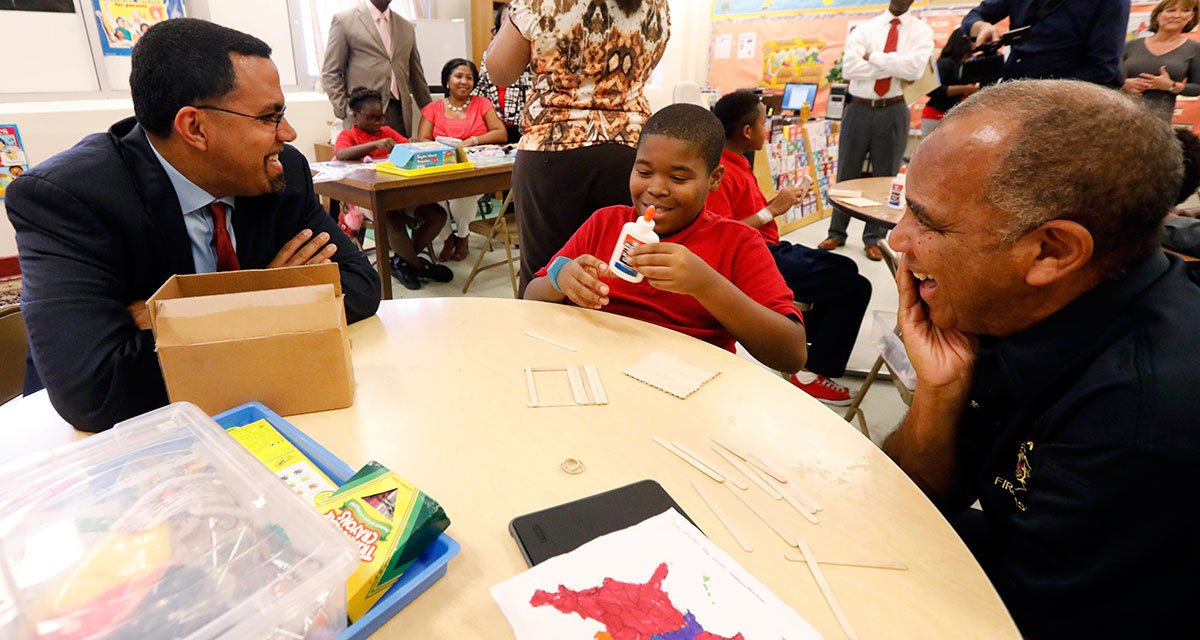The Paskenta Band of Nomlaki Indians has become the first tribe to win a federal Promise Neighborhood grant, which aims to transform distressed communities.
Staff writer | @StacyTKhadaroo
—It began with everyone in the Corning-Paskenta Tribal Community doing their parts.
There were home visits to new parents, a deep look at how to boost early-reading skills,and programs to help middle-schoolers avoid substance abuse and violence.
There were four years of surveys and research on what worked and what didn’t. And there were dozens of meetings that reached out to many groups normally left out of policy discussions, such as teen parents and migrant workers.
The goal was to fundamentally change the trajectory of a tribe where per capita income is only about half the California average and less than 25 percent of children in grades K-8 have the language, writing, and math skills needed to reach state standards.
Now, the effort is getting some help. The Paskenta Band of Nomlaki Indians has become the first tribe to win a federal Promise Neighborhood grant, which aims to transform distressed communities by funding “great schools and strong systems of family and community support,” according to the website.
In the process, northern California’s Corning-Paskenta community has pointed the path for other native communities, showing how local tribes can bring momentum to solutions-oriented thinking.
“The tribe has been the glue that has brought together the partners to make some sustained efforts toward addressing some of these systemic problems,” says Matthew Russell, director of the local implementation of the grant and a longtime resident of the area, though not a member of the tribe.
How the money can help
The United States Department of Education recently awarded $2.7 million to the Paskenta Band – one of six groups to win this round of Promise Neighborhood funding. The group has also raised $1.4 million in local matching funds.
The tribe itself is small, but the grant will benefit Corning and the surrounding area, with its 10,000 residents and two public school districts that serve many Latino immigrants.
The money will go toward addressing entrenched challenges. The tribe owns a casino that is one of the key employers in the area, but unemployment is high. Crime is almost double the state average, and the community has struggled with the effects of methamphetamine production, opioid addiction, and gang activity.
More than a third of high school freshmen in the area don’t end up with a diploma.
The response taking shape has been community-wide.
“We really define what a community is all about,” says Andrew Alejandre, chairman of the Paskenta Band of Nomlaki Indians. “Education is so important, and we really want to give back to our community.”
It includes:
- More teacher training and intensive reading instruction for young children.
- A case-management system to address everything from mental health to substance abuse to domestic violence.
- School supports “to make sure the youth have somewhere to go and something to do” when they are not in school, Mr. Alejandre says. “A lot of parents work, and a lot of children are left at home… It’s not that any of them are bad kids, but sometimes they make bad choices, because no one is there to supervise them.”
- Therapy for children affected by trauma and a promise from schools to address behavior problems in a supportive way before they lead to discipline issues.
- Extensive after-school and summer English-language programs. Community analysis found that about 8 of 10 dropouts have very low English-language skills.
Signs of success
First launched in 2010, Promise Neighborhood grants are inspired by the Harlem Children’s Zone, which offers holistic support to students ranging from anti-poverty programs to health care.
In Indianola, Miss., 82 percent of third-graders served by a 2012 Promise Neighborhood grant passed a state literacy test this year, up a few points from the year before. And 59 percent of students who couldn’t pass the test last fall were able to do so by the spring. Between 2013 and 2015, the percentage of children fully prepared for kindergarten doubled, to 52 percent, the Urban Institute reports. Indianola just won another grant to continue the work.
Other recent grantees are receiving one year of funding now, but the hope is for them to receive funding for up to four more years so they can build long-term change.
Applications for Promise grants have risen from 45 in 2011 to 72 this time around, says Elson Nash, team leader for Promise Neighborhoods and Full Service Community Schools at the Department of Education.
“The school environment is critically important, but if we can help the home and neighborhood environment with population-level change, it moves the whole community to some sustainable results,” Mr. Nash says.

